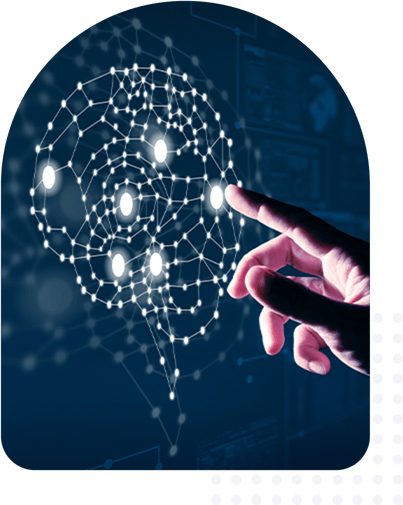Artificial Intelligence in Customer Service...Your Questions Answered
Offering high-quality customer service is key when it comes to finding new customers, retaining existing ones and creating a loyal customer base that will use your business time and time again.
A business can have a superior service or product, but if it’s not offering an experience that its customers are delighted with, it could soon find itself losing revenue.

.png?width=1920&height=208&name=accent-curve-bottom@2x@2x%20(1).png)
Chapters
AI and Contact Centers
So, what AI tools for customer service do companies use to make sure they are constantly progressing and ahead, or at least level with, the curve of change?
Making the most of new technologies, such as artificial intelligence (AI) and chatbots, is a vital step in building a world-class customer service program that delivers excellent customer experiences (CX) time and time again.
Any business that has, or still does, use the traditional call center will be aware of its problems. No matter how much training a representative is given, it’s near impossible for them to meet the ever-changing omnichannel demands of the consumer.
Whether the representative is waiting on hold while they are trying to get in touch with the appropriate department, or searching one of the many CRMs they have in front of them, the experience can be a slow and often frustrating one for the customer.
Each year $62 billion is lost through poor customer service, according to pwc’s Consumer Intelligence Series.
However, advances in technology have changed the game. This is where AI comes into play.
According to the pwc research, AI can help plug that leak by going above and beyond what humans are capable of. Not only can artificial intelligence be used to lower customer effort, but it’s a more efficient way to direct the consumer to the information they need.
Some 60 percent of consumers agreed that AI tools can reduce the time it takes to get an answer while still being tailored to their preferences, while 38 percent said AI can offer a “superior one-to-one personalized experience.”
How to Deliver Superior Customer Service with Contact Center AI
Download your copy of this informative guide and get the insights into how AI can truly benefit your customers!

What is Artificial Intelligence (AI) in Customer Service?
Simply speaking, AI is the umbrella term for a number of technologies that mimic the cognitive functions associated with humans, such as learning, problem-solving, and reasoning.
Artificial intelligence technologies can be used in number of different ways in customer service, including improving the customer experience through customer-facing technologies (such as chatbots or better customer routing), enhancing the customer service agent performance through real-time feedback, performance analysis and process automation, as well as gaining actionable business insights that improve program outcomes and efficiencies.
“Companies that embrace AI will get a competitive edge.”
Contact center AI helps to substantially reduce customer effort by cutting out human error and connecting businesses with the customer on an omnichannel level, as well as significantly improve internal customer service efficiencies.
There are three core AI technologies when it comes to customer service:
- Machine learning: AI programs are able to use machine learning to adapt to different circumstances and data patterns. This could include being able to detect sarcasm, mimicking, the change in volume and the change in pitch of a consumer to gain real-time insights into how a customer is feeling about a conversation.
- Big data: Artificial intelligence is able to find patterns in large amounts of varied, fast-moving data to give customer service agents real-time data that empowers them to offer the best possible customer service. Business insights can also be gained that allow for a proactive customer service program that’s more efficient and knows exactly how to meet customer expectations.
- Natural language processing: Natural language processing allows AI programs to understand language as spoken and written by humans, and reply to them as a human would. Through complex algorithms, chatbots are able to create a back-and-forth dialogue with customers and either answer their question or collate enough detailed data to direct them to a relevant customer service agent who can provide greater value to the customer.
According to Bloomberg Intelligence, artificial intelligence software is likely to be the most disruptive force in technology in the coming decade, and companies that embrace AI will get a competitive edge.
Artificial Intelligence Enhances Customer Service Agent Performance
Artificial intelligence has a number of use cases in contact centers, helping to significantly improve agent productivity and performance, as well as deliver better customer service results.
Contact center AI is used to enhance customer service agent performance in a number of ways. AI technology can be used to listen or read (depending on which type of AI software you are using in your customer service strategy) to conversations for both the content and tone of the customer.
By detecting sarcasm, mimicking, change in volume, change in pitch and much more, artificial intelligence technology can help customer service programs gain real-time insights into how customers are feeling and how they rate their experience with your company.
These insights allow for in-the-moment feedback to be supplied to customer service agents, which leads to dramatically improved customer service outcomes. Ensure high customer service levels are being met with every call.
Additionally, contact center AI also has its place in reducing agent effort giving them more time to focus on the tasks that truly matter. For example, chatbots can answer easy customer queries on behalf of an agent, while automation technologies make it easier for agents to complete manual tasks so that they can spend more time on high-value customer interactions.
AI Enabled Customer Service Can Boost Your Revenue
These tools, along with the recent developments in artificial intelligence, have significantly benefited the way contact centers communicate with customers.
The use of AI technology has allowed customer service representatives to improve and scale their customer service effort, as well as helping them to improve the customer experience and reduce customer effort.
AI, chatbots and automated self-service technologies free up call center employees from routine support requests so they can focus on more complex tasks that offer higher value to your customers. Not only that, but AI also gives customer service representatives more detailed and real-time information to help them handle complicated issues.
A recent study, from global management consulting business McKinsey & Company, claims marketing and sales departments are the top sectors that will be transformed by AI technology - and the transformation is happening now.
When you work with an outsourced contact center that uses innovative AI technology, your business will be able to drive better customer service outcomes, improve efficiencies, save money, and, ultimately, boost your revenue.
A Personalized Approach to More Sales
AI can help boost your revenue by improving the customer experience, keeping your customers happy and enticing them back with good service, but it can also create a personalized approach that allows you to up-sell your products or services.
AI technology combines customer demographics and past transaction data with social media monitoring to create individualized product recommendations, helping to increase your sales and boost revenue.
The McKinsey study cites the “next product to buy” feature that companies such as Amazon and Netflix have been successfully implementing. The AI sales tactic targets individual customers with recommended products they might like, and McKinsey claims this leads to a two-fold increase in the rate of sales conversions.
No longer is customer service merely about making a customer happy after the sale. It’s about creating a seamless and easy experience that is proactive, as opposed to the conventional reactive approach of dealing with problems when they occur.
Moreso, the McKinsey report mentions a case study, in which a travel company used AI technology to offer additional services such as hotels and airlines via a recommendation system algorithm that took into account product and customer data.
This personalized approach offered to the company’s customers led to a 10-15 percent increase in revenue for the company.
AI Is Lowering The Customer Effort
An important aspect of delivering an excellent customer experience is reducing the customer effort, and building an omnichannel experience where you engage with your customers on their preferred channels.
Are you designing your customer service channels specifically with your customers in mind, so they are easy to understand and use?
To find out, you can measure customer effort through customer surveys and polls, whether its Customer Effort Score (CES), Net Promoter Score (NPS) or Customer Satisfaction Score (CSAT).
With that in mind, millennials are becoming the most important customers, making up the largest demographic group of modern consumers. This tech-savvy demographic demands effortless experiences – quick, slick, and often in the nick of time.
So, how do you deliver high value, high-performance customer service that will leave customers, and in particular millennials, saying “that was easy..”?
Through artificial intelligence of course. AI empowers customer support agents to offer a seamless service and makes the experience your customers have with your company significantly easier, more efficient and 100 times more enjoyable.
Here are some specific ways that AI can decrease customer effort and help solve problems:
Seeking help: Artificial Intelligence allows customers to stay within their chosen method of interaction such as social media, e-mail, or route calls more effortlessly to the best possible resource.
Waiting: Artificial Intelligence decreases wait times substantially by either offering virtual assistance through chatbots or instantly connecting customers to a live person as required.
Explaining: Artificial Intelligence spares customers from having to explain their personal information, purchase details and other data. AI is designed to “learn” from the data about each customer and either work directly with them to solve problems or serve up the necessary details to a live agent.
DIY: Artificial intelligence has improved self-service significantly. Besides chatbots that can automate many of the most common back-and-forths that go on between companies and their customers, the technology can dynamically access the most relevant and specific details to help customers resolve their own issues.
Proactive: Artificial intelligence reduces customer effort by anticipating what they might need before they need it, and offering content or tools to proactively mitigate pitfalls they could encounter with a product or service.
Agility: The data collected through artificial intelligence can be used to learn about what customer effort looks like across a particular geography, size of the account, customers who purchased a specific product or other segments. AI can help develop strategies that could directly lower the overall average of CES scores.
How are Chatbots Used in Customer Service?
An important aspect of delivering an excellent customer experience is reducing the customer effort, and building an omnichannel experience where you engage with your customers on their preferred channels.
A chatbot is a computer program that you can talk to through either a chat window on a website, an app or by voice. Chatbots have the ability to answer questions, creating a back-and-forth dialogue that is similar to that of a human representative.
Techniques, such as machine learning and deep learning, are allowing chatbots to become more accurate in predicting outcomes and directing users to the correct source of information.
As a result, businesses are increasingly seeing the importance of their role in the customer service experience. In fact, according to research from Grand View Research, the global chatbot market is expected to reach $1.25 billion by 2025.
“The global chatbot market is expected to reach $1.25 billion by 2025.”
Chatbots are useful in numerous aspects of the consumer experience. They provide customer service, they present product recommendations, they engage customers through targeted marketing campaigns and they can provide advice on how to deal with a faulty product or service.
Perhaps most importantly, chatbots are able to direct consumers to the appropriate representative that can help them further. Using complex algorithms, chatbots are able to have a one-on-one dialogue with the consumer to pinpoint their exact need and who they will be best served speaking to.
What are the benefits of chatbots in your customer service program?
- Available 24/7: Chatbots are available 24/7, meaning customers from all around the world can receive care every hour of every day.
- Automation: An automated computer will not become bored of completing the same task over and over again - an employee could.
- Customer satisfaction and reduced customer effort: The complex algorithm of a chatbot means it will always lead customers to the correct information or representative, they are not led by emotion.
- Multitasking: Chatbots are capable of dealing with thousands of people at any given time. The average human can only focus on three or four tasks at any given time.
.png?width=1920&height=208&name=accent-curve-top@2x%20(1).png)
Are You Interested in Learning More About Contact Center AI?
While AI technology often seems like a future construct, it is being used right here today in contact centers to revolutionize a new approach to customer service.
Artificial intelligence is here to stay and is already an increasingly important part of customer support as we move into the future. To find out how Advantage Communications leverages state-of-the-art artificial intelligence to transform our clients approach to customer service, contact us today.

















